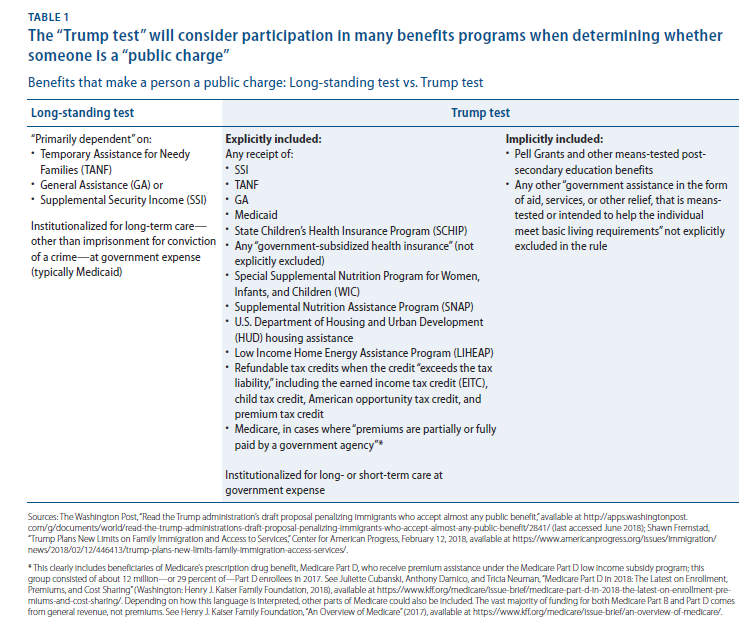The U.S. Department of Homeland Security (DHS) is considering a plan that would drastically and unilaterally restrict legal immigration to only the wealthiest and most privileged applicants.
An archaic federal immigration provision called the “public charge” test is currently being drafted by the Trump administration. Immigrants coming to the United States would generally fail this new rewritten test if they had a medical condition and no source of subsidized health insurance.
The test also places a premium on an applicant’s income and assets. Applicants must make at least 250 percent of the federal poverty guidelines, which, in 2018, means $30,350 for a one-person household and $62,750 for a four-person household. By comparison, the average American working full-time typically makes around $51,640 for men and $41,554 for women.
According to a new report from the Center For American Progress, if every American citizen were forced to take the Trump administration’s test, more than 100 million people — roughly one-third of the U.S. population — would fail. The report also estimates that at least half of all people in the country could fail the test over a period of several years, when factoring in possible economic downturns, job insecurity, health problems, or other factors. (ThinkProgress is an editorially independent newsroom housed within the Center for American Progress.)
The term “public charge” has its roots in a dark period of American history, having first surfaced the same year Congress adopted the Chinese Exclusion Act. In 1882, Congress also adopted another law that banned “any convict, lunatic, idiot, or any person unable to take care of himself or herself without becoming a public charge.” The test was initially aimed preventing the immigration of Irish Catholics to the United States and was later used by immigration officials to keep out Jewish refugees fleeing Nazi Germany along with LQBTQ immigrants, individuals with disabilities, and even unmarried women.
As the report notes, the term “public charge” has long been interpreted by the courts and the executive branch to be consistent with a historical understanding of what it means to be a “charge” — effectively, a ward of the state:
According to long-standing interpretation, an immigrant applying for a family-based or diversity visa is considered “likely to become a public charge” if they are likely to become “primarily dependent” on means tested public cash assistance—Temporary Assistance for Needy Families (TANF), General Assistance (GA), or Supplemental Security Income (SSI)—or are likely to be institutionalized for long-term care at the government’s expense, excluding imprisonment or conviction of a crime.
What the Trump administration is proposing expands that criteria to include anyone who receives or is likely to receive “any government assistance in the form of cash, checks or other forms of money transfers, or instruments and non-cash government assistance in the form of aid, services, or other relief, that is means-tested or intended to help the individual meet basic living requirements.”

The rewritten Trump test would treat perfectly employed individuals as “public charges” by expanding the test to include additional benefits working-class Americans have access to if they meet a certain threshold. That includes the earned income tax credit (EITC), Medicare, and Supplemental Nutrition Assistance Program (SNAP), known colloquially as “food stamps” — a program nearly 42 million American citizens rely on, many of whom are working.
Forcing immigrants to forgo these programs would have an acute impact on immigrant women and children who qualify for and would benefit from programs like SNAP, Medicaid, or the EITC. As the Center on Budget and Policy Priorities (CBPP) notes:
Women who qualify for Medicaid that would cover prenatal care and labor and delivery may feel that they face the impossible choice of (1) risking a public charge determination by signing up for this coverage, (2) finding a way to pay thousands of dollars for labor and delivery, as well as prenatal and postpartum care, or (3) going without needed care.
Children without SNAP would also miss out on its benefits, which include greater rates of high school completion and a lower incidence of heart disease, stunted growth, and obesity as adults. Without the EITC, families would immediately face more poverty and hardship, weakening labor market prospects in the future. The tax credit also improves school performance, according to research by the CBPP.
The Trump test also focuses on whether the applicant would be a “public charge” by determining whether they have a medical condition with no form of health insurance, are currently receiving any government assistance, have recently received government assistance, or are currently not working or enrolled in school full-time. It gives the administration the authority to take into consideration any other factors “in the discretion of DHS,” essentially giving the government carte blanche to decide whether to pass or fail an applicant.
If an applicant “fails” a test, the administration could allow immigration officials to admit them to the country on the condition of a “public charge bond,” set at a minimum of $10,000.
The potential policy change is the latest radical attempt by the Trump administration to categorize immigrants as low-skilled and unworthy of living in the United States.
In June, the majority-GOP House of Representatives voted against a hard line immigration bill backed by President Trump that placed harsh restrictions on family and diversity-based immigration. According to some Republicans, the bill was too lenient and amounted to “amnesty.”
